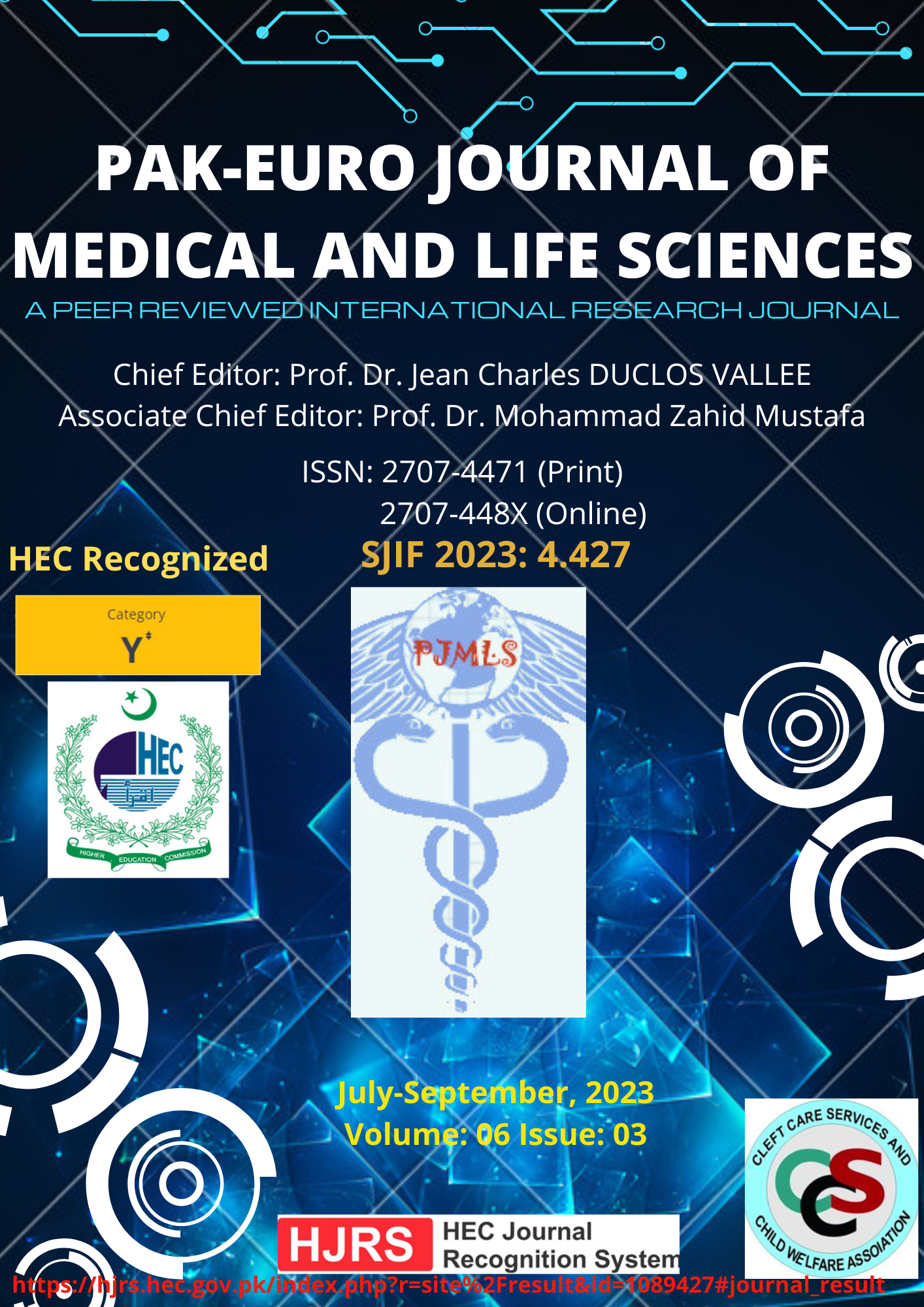Knowledge, Attitude and Practice towards Pelvic Floor Keagle Exercises in Antenatal Pregnant Women of 3rd Trimester
DOI:
https://doi.org/10.31580/pjmls.v6i3.2862Keywords:
Attitude, Keagle exercises, Pelvic floor, Pelvic floor dysfunction, KnowledgeAbstract
Background: Exercises are specifically designed to improve health benefits for expectant moms and fetus, so pregnant women should be encouraged to continue their exercise regimens so they can benefit from them. Antenatal exercise provides great advantages and minimal hazards; however, it may need to be modified based on the requirements of the woman and the fetus. Women should exercise for 30 minutes, on average, five days a week.
Objective: The objective of this study was to determine knowledge attitude and practice towards pelvic floor Kegel exercises in antenatal pregnant women of 3rd trimester.
Methodology: A descriptive cross-sectional KAP survey with a sample size of 388 targeting prenatal women of district Gujrat, Punjab Pakistan. Data was collected by self-structured, close ended questionnaire whose reliability was calculated by a pilot study. The reliability of the questionnaire was (Cronbach’s a=0.752). Questionnaire contained segments demographic data, gynecological history, questions about knowledge practice and attitude. Considering inclusion and exclusion criteria data was collected from the targeted population after a written informed consent. SPSS software version 20 was used to analyze data.
Results: There were 189(55.9%) women of age group 18-30 and 149(44.1%) belonged to age group 30-40. 12.7% women had 3-7 no. of births, 61.8% had 1-3 and 25.4% women had no children. In type of delivery 45.9% women had c-section, 30.5% had vaginal delivery remaining 23.7% were primigravida. In my study only 24.9% women had high level of knowledge, 13.3% had moderate and the remaining 61.8% had poor knowledge of pelvic floor Kegel exercises, 219.9% women had positive and 70.1% had negative attitude towards exercises, 7.98% had good practice 10.9% had moderate and 81.07% had poor practice of exercises. The associations between knowledge and attitude, knowledge and practice, attitude and practice were significant (p-value <0.05).
Conclusion: The findings of the study shows that there is low level of knowledge, attitude, and practice of pelvic floor Kegel exercises during antenatal pregnant women. Very few of them were practicing and most of the participants had negative attitude towards exercises.
References
Liu N, Gou W-h, Wang J, Chen D-d, Sun W-j, Guo P. Effects of exercise on pregnant women’s quality of life: A systematic review. European Journal of Obstetrics & Gynecology and Reproductive Biology. 2019;242:170-7.
Janakiraman B, Gebreyesus T, Yihunie M, Genet MG. Knowledge, attitude, and practice of antenatal exercises among pregnant women in Ethiopia: A cross-sectional study. PloS one. 2021;16(2):e0247533.
Temtanakitpaisan T, Bunyavejchevin S, Buppasiri P, Chongsomchai C. Knowledge, attitude, and practices (KAP) survey towards pelvic floor muscle training (PFMT) among pregnant women. International journal of women's health. 2020:295-9.
Jarni MF, Mohamad MY, Kamarudzaman N. Knowledge, Attitude, and Practice (Kap) Towards Pelvic Floor Muscle Exercise Among the Female Population Attending the Obstetrics and Gynaecology Clinic at Sultan Ahmad Shah Medical Centre (SASMEC@ IIUM). International Journal of Allied Health Sciences. 2021;5(6):2521-9.
Gao L, Wang S, Zhang D, Zhu H, Jia Y, Wang H. Pelvic Floor Muscle Strength in the First Trimester of Primipara: A Cross-Sectional Study. International Journal of Environmental Research and Public Health. 2022;19(6):3568.
Goodridge SD, Chisholm LP, Heft J, Hartigan S, Kaufman M, Dmochowski RR. Association of knowledge and presence of pelvic floor disorders and participation in pelvic floor exercises: a cross-sectional study. Female pelvic medicine & reconstructive surgery. 2021;27(5):310.
Li J, Sun X, Wang C, Zhang Z, Xie Z. A Mobile Application Penyikang Applied in Postpartum Pelvic Floor Dysfunction: A Cross-Sectional Study to Analyze the Factors Influencing Postpartum Pelvic Floor Muscle Strength and Women’s Participation in Treatment. BioMed Research International. 2020;2020.
Majeed R, Zehra S, Furqan Z, Shoukat M, Samad M, Gulzar T. Knowledge, Attitude and Practice among Women Regarding Postnatal Exercises; A Cross-Sectional Study Across Lahore in Private Sector. Pakistan Journal of Medical & Health Sciences. 2022;16(03):883-.
Bø K, AH Haakstad L, Voldner N. Do pregnant women exercise their pelvic floor muscles? International Urogynecology Journal. 2007;18:733-6.
Muhammad J, Muhamad R, Husain NRN, Daud N. Pelvic floor muscle exercise education and factors associated with implementation among antenatal women in hospital Universiti Sains Malaysia. Korean journal of family medicine. 2019;40(1):45.
Ihegihu E, Nnam I, Amaechi I, Umunna J, Maduagwu S, Akobundu Ua. Knowledge, Attitude and Practice of Pelvic Floor Muscle Exercise among Pregnant Women Attending Antenatal Clinics in Nnewi, Nigeria. 2022.
Habib M, Sohail I, Nasir M, Nasir F. Awareness, knowledge and practices of Pakistani women towards Pelvic Floor Muscle Exercises (PFMES) during pregnancy. Journal of The Society of Obstetricians and Gynaecologists of Pakistan. 2020;10(2):121-4.
Hasan M, Zahid S, Hafeez S, Hashmi Z, Mannan H, Hassan D. Knowledge and attitude of Pakistani women towards antenatal exercise: A cross-sectional survey across Lahore. JPMA The Journal of the Pakistan Medical Association. 2019;69(12):1900.
Davenport MH, Ruchat SM, Poitras VJ, Garcia AJ, Gray CE, Barrowman N, Skow RJ, Meah VL, Riske L, Sobierajski F, James M. Prenatal exercise for the prevention of gestational diabetes mellitus and hypertensive disorders of pregnancy: a systematic review and meta-analysis. British journal of sports medicine. 2018;52(21):1367-75.
Adjei AA, Armah HB, Gbagbo F, Ampofo WK, Quaye IK, Alberti A, Clumeck N, Collins S, Gerlich W, Lundgren J, Palu G. HIV infection and AIDS. AIDS. 2005;19:S106-15.
Downloads
Published
Issue
Section
License
Copyright (c) 2023 Pak-Euro Journal of Medical and Life Sciences

This work is licensed under a Creative Commons Attribution 4.0 International License.






